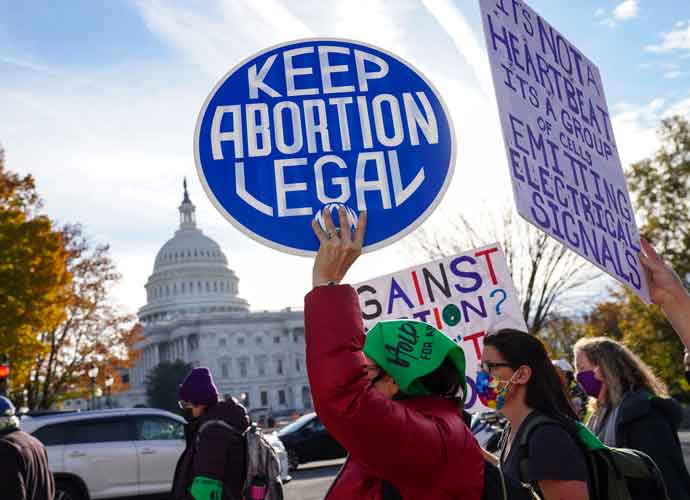

WASHINGTON, DC - DECEMBER 01: Participants hold signs during the Women's March "Hold The Line For Abortion Justice" at the U.S. Supreme Court on December 01, 2021 in Washington, DC. (Photo by Leigh Vogel/Getty Images for Women's March Inc)
A woman from Louisiana carrying a nonviable fetus had to travel about 1,400 miles to get an abortion in New York after her local hospital refused to perform the procedure.
Doctors claimed uncertainty about the legality of proceeding with an abortion in face of the strict ban adopted in the state after the Supreme Court overturned federal abortion rights established by the landmark Roe v. Wade ruling of 1973.
Nancy Davis, 36, discovered in late July, when she was 10 weeks into her pregnancy, that her fetus was missing the top of its skull, a rare and fatal condition called acrania. According to the medical evaluation, if Davis decided to give birth, the baby would die minutes or days later.
“So the only thing that came to my mind whenever we assessed the situation and analyzed it, was that I was carrying my baby to bury my baby,” she described in a recent interview with local public radio WNO. “So that’s why we made the decision.”
Subscribe to our free weekly newsletter!
A week of political news in your in-box.
We find the news you need to know, so you don't have to.
Fearing being prosecuted, officials at a local hospital refused to proceed with the abortion.
Louisiana’s abortion ban law does have exceptions for fetuses that can’t survive outside of the womb, but there are no specific references to acrania.
Without options, Davis went public about her problem and received more than $40,000 in donations through a crowdfunding campaign and was able to pay for her travel to New York, where abortion is legal.
She had her procedure at a Manhattan Planned Parenthood clinic early September, two months after learn about her baby’s condition.
“Now that I’ve received the care, I’m just trying to to move forward on a positive note and to help as many women as I possibly can,” Davis said, after describing the experience as a nightmare.
In an interview, Davis’s attorney, Ben Crump, criticized the vague abortion ban law in Louisiana.
“I understood that Nancy was very symbolic of many of the black women in the state of Louisiana,” he told WNO. “Louisiana has one of the highest maternal mortality rates in the country. Disproportionately, black women die during childbirth in the state of Louisiana.”
“Nancy Davis, this young black woman who was told that her baby was going to die, she could not have an abortion because the state of Louisiana enacted very vague,” Crump added.
When the news was first reported by the local media, Karina Jackson, the Democratic state senator who wrote the abortion ban law, told reporters she believed a misunderstanding happened at the hospital and the law should have covered Davis’s case.
“This woman is not seeking an abortion,” said Jackson. “This woman is seeking a medical procedure for a pregnancy that is not viable outside of the womb.”
President Donald Trump responded forcefully to a Wall Street Journal article about a message he…
The Supreme Court will consider hearing a case this fall to overturn the landmark decision…
Australian Prime Minister Anthony Albanese announced Monday that Australia will officially recognize a Palestinian state…
President Donald Trump and Russian President Vladimir Putin are set to meet in a summit…
After former Vice President Kamala Harris, who was California's attorney general from 2011 to 2017…
Texas is currently the focus of the national redistricting battle, but Florida may soon join…